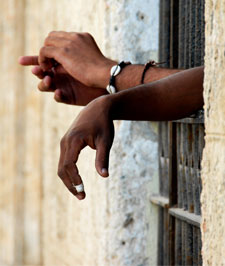Archbishop Peter Jensen has branded NSW prisons as "expensive, discriminatory and ineffective'.
In an opinion piece appearing in today's Sydney Morning Herald Dr Jensen has criticised the disproportionate numbers of indigenous and mentally ill people in the prison population.
 "There are now almost as many prisoners in the State of NSW alone than there were prisoners in the whole of Australia in 1977. The prison population is burgeoning at a rate far exceeding population rise," he says.
"There are now almost as many prisoners in the State of NSW alone than there were prisoners in the whole of Australia in 1977. The prison population is burgeoning at a rate far exceeding population rise," he says.
"There are also increasing numbers of women, including indigenous women prisoners."
The Archbishop has called the rate of return to prison “unacceptably high” and also highlights the financial cost to the community " which is around $60,000 per year per prisoner.
"Politicians respond to our fear of crime by being anxious to avoid all risk and so create a stricter regime of policing and imprisonment."
Dr Jensen says one of the key tests for the spiritual good health of a community is the quality of its prisons.
"How are vulnerable people treated when they are at our mercy? As human beings, those who are being punished deserve a system that balances rehabilitation and restoration alongside retribution," he says.
"God's challenge to us is that we be a community that is both just and compassionate in our treatment of others, especially those who are in our custodial care."
Chaplains confirm mental illness tragedy
A Silverwater prison chaplain says hospitals that can properly care for the mentally ill are drastically needed, as many are trapped in the prison system cycle.
Anglican chaplain at the remand centre in Silverwater prison, the Rev David Pettett has confirmed the Archbishop's observation that mentally ill people make up a disproportionately high number of prisoners.
"What's happening is people with mental illness are out on the streets, not getting the community care they need," he says.
"They are committing crimes due to their illness, but instead of getting treatment in hospital, they get incarcerated."
Mr Pettett has observed some progress with the Department of Corrective Services opening a mental health unit at the remand centre last year.
Mr Pettett says he also understands the community wanting tougher sentences for offenders.
"I think the community is fed up with light sentences and people coming in and out of jails. However, the law has been changed from presumption in favour of bail to presumption against bail," he says.
"Previously, the prosecution had to prove why a person shouldn't be allowed bail, now the person arrested has to prove their worth for getting bail."
Nevertheless, Mr Pettett calls prison chaplaincy the “best ministry I've ever done” of his thirty years in full-time ministry.
"I spend my time wondering around talking to guys and lots are looking for direction. I'm actually seeing guys being converted left, right and centre."




















